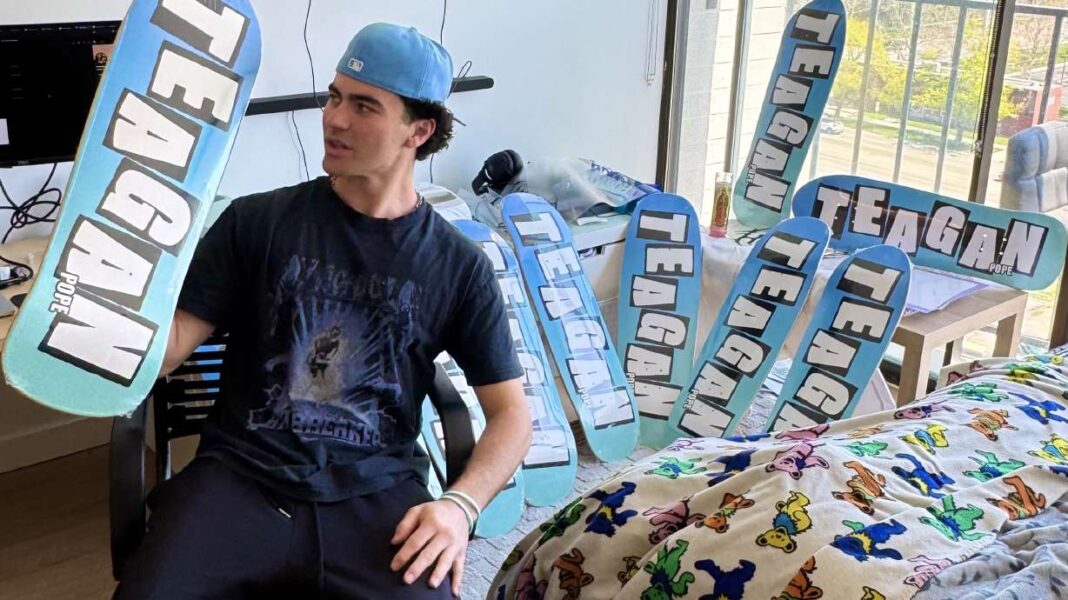SALT LAKE CITY — Cole Brunner was supposed to cross the graduation stage this spring with his best friend, Teagan Pope. Now, Brunner plans to graduate alone after losing his friend to an accidental overdose.
Brunner and Pope grew up in different California beach towns before they met as freshmen at the University of Utah. The pair quickly bonded over their mutual love for surfing and skateboarding.
“Honestly, he was like the closest friend I’ve ever had, which is crazy because I didn’t know him for my whole life, but it definitely felt like it,” said Brunner.
Brunner describes Pope as having a loving family, large friend group and a bright future. But Pope also suffered from poor mental health, leading him to self-medicate with illegal substances. He received psychiatric care and was treated in a rehabilitation center but still struggled to overcome the addiction completely.
In November 2024, Pope died by accidental overdose after taking a counterfeit pill made of bromazolam and oxycodone. He was 22 years old.
Brunner says the overdose happened at a party where naloxone, the opioid overdose reversal medication, was likely nearby and available, but no one helped Pope.
“It was really sad,” said Brunner. “The (people he was with) were too scared to call the ambulance … so they left him where he was for at least, like, six hours or something. I have no idea who they were, but they had Narcan in the room, I’m like 90% sure. They were all just too high and scared to use it.”

In the midst of learning how to navigate grief as a young college student, Brunner decided to take action to honor Pope’s memory in the months following his death.
He launched “SafeSteps: Rise Against Risk,” an initiative to promote overdose awareness and harm reduction for University of Utah students. The initiative focuses on educating students on how to use naloxone, something he believes would have saved Pope’s life if those around him were able to use it.
SafeSteps also focuses on advocating for policy change to allow greater naloxone access and spreading information to students about legal protections like the Good Samaritan law — a law that protects individuals from being liable for damages caused when providing emergency care, like administering naloxone. A 2014 amendment to the Utah criminal code also protects people who are using an illegal substance and call first responders to report an overdose.
SafeSteps specifically works with incoming freshmen and students in fraternities, where Brunner says many have a higher risk of being exposed to drug use.
“I just wanted to send a message that if you do go to use, be educated. And if you’re not going to use, help support other students instead of running away from actually helping them,” he said. “In our friend group, they all kind of never thought (someone) would have died from this stuff. I caught on early that he was using way more than just for fun, and it hurt to watch, seeing him like that.”
On April 1, Brunner held a memorial for Pope at the University of Utah, in collaboration with the Center for Campus Wellness, during the university’s overdose prevention week. At the event, students received training on how to administer naloxone from a university health educator and discussed resources for those struggling with substance use.
The memorial was centered around using skateboarding — one of Brunner’s and Pope’s shared hobbies — to cope with anxiety and stress. Brunner commissioned specialized skateboard decks and bracelets for Pope’s family and friends and distributed custom playing cards designed to raise awareness.
“I wanted to do something for him, something cool to honor him,” Brunner said. “I ordered like 20 skateboard decks with his name on them … for close friends that knew him that wanted one, and the school helped me out with that. (We were) pushing a message at that event to find other natural highs, like skateboarding. Being from California, it’s in our DNA to surf and skate. It’s just something we bonded over and something, I think, that did help him when he was using.”
As Brunner continues his advocacy for overdose prevention, he wants to focus on encouraging others to find their natural high or passion in life. National drug prevention nonprofit Natural High advocates for this method of coping, citing an Icelandic case study that showed substituting a hobby like dance or art in place of drugs and alcohol helped teens better cope with life.
Reflecting on his experience, Brunner says he still grapples with the pain of losing a friend to a drug overdose at such a young age and not having many resources available to cope with the loss.
“I really only talked to him when I was going through stuff, so it was a real eye-opener for (me) … to enjoy every moment. We had so many great moments, like looking back, I don’t regret anything,” he said.
Brunner invites all Utahns to join him in advocating for improved overdose prevention education. More information on his efforts to share opioid safety awareness can be found on Brunner’s LinkedIn profile.
The Key Takeaways for this article were generated with the assistance of large language models and reviewed by our editorial team. The article, itself, is solely human-written.




